Essert-Pittet
| Essert-Pittet | ||
|---|---|---|
| Former municipality of Switzerland | ||
|
||
| Coordinates: 46°44′N 6°35′E / 46.733°N 6.583°ECoordinates: 46°44′N 6°35′E / 46.733°N 6.583°E | ||
| Country | Switzerland | |
| Canton | Vaud | |
| District | Jura-Nord Vaudois | |
| Government | ||
| • Mayor | Syndic | |
| Area | ||
| • Total | 2.76 km2 (1.07 sq mi) | |
| Elevation | 450 m (1,480 ft) | |
| Population (2015) | ||
| • Total | 164 | |
| • Density | 59/km2 (150/sq mi) | |
| Postal code | 1435 | |
| SFOS number | 5915 | |
| Surrounded by | Chavornay, Épendes, Orbe, Suchy | |
| Website | Profile (French), SFSO statistics |
|
Essert-Pittet is a former municipality in the district of Jura-Nord Vaudois of the canton of Vaud in Switzerland. In 2017 the former municipalities of Essert-Pittet and Corcelles-sur-Chavornay merged into the municipality of Chavornay.
Essert-Pittet is first mentioned in 1100 as Exertus. In 1453 it was mentioned as Essers. It was first known as Essert-Pittet before 1764.
Essert-Pittet had an area, as of 2009[update], of 2.8 square kilometers (1.1 sq mi). Of this area, 2.26 km2 (0.87 sq mi) or 81.9% is used for agricultural purposes, while 0.17 km2 (0.066 sq mi) or 6.2% is forested. Of the rest of the land, 0.31 km2 (0.12 sq mi) or 11.2% is settled (buildings or roads), 0.02 km2 (4.9 acres) or 0.7% is either rivers or lakes.
Of the built up area, housing and buildings made up 1.8% and transportation infrastructure made up 9.1%. Out of the forested land, 4.7% of the total land area is heavily forested and 1.4% is covered with orchards or small clusters of trees. Of the agricultural land, 75.0% is used for growing crops and 5.8% is pastures, while 1.1% is used for orchards or vine crops. All the water in the municipality is flowing water.
The former municipality was part of the Yverdon District until it was dissolved on 31 August 2006, and Essert-Pittet became part of the new district of Jura-Nord Vaudois.
The blazon of the municipal coat of arms is Gules, three Acorns Argent two and one.
Essert-Pittet had a population (as of 2015[update]) of 164. As of 2008[update], 20.3% of the population are resident foreign nationals. Over the last 10 years (1999–2009 ) the population has changed at a rate of 11.9%. It has changed at a rate of 11% due to migration and at a rate of 2.5% due to births and deaths.
...
Wikipedia



